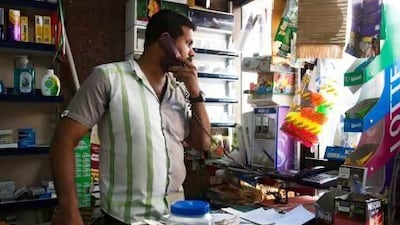ABU DHABI // Today marks the start of a new era for the capital's grocery stores, as stringent new regulations mean closure for some but a bright new look for others.
Many shop owners unable to afford the changes were yesterday preparing to shut their doors for good - and for many of their workers, heading home - while others were putting the final touches on their renovations.
Abu Dhabi Food Control Authority (ADFCA) told the capital's 1,300 neighbourhood groceries - or dukhan - in May 2011 that they had until the end of last year to modernise in line with new storage and sanitation rules aimed at making them more hygienic.
But many were unable to afford the changes and were yesterday shutting for good.
Adam Ebraham was serving customers at Al Astoora Food Stuff in the Muroor Road area for the last time.
The 35-year-old, who had owned the business for 10 years, said he would return to India as he did not have enough money for upgrades.
"I will throw away the [leftover] products or take them to my country. I'm not sad, why would I be angry or sad? It's OK. I will find a job in India. Many groceries are shutting because they cannot afford it," he said.
The shop Mundekat Thottiyil Khalid had worked at for 17 years had already shut, closing its doors about two weeks ago.
Standing outside, the 53-year-old Indian said he was sad the branch of Power Grocery had closed.
"I wanted to stay more - five or 10 years - no problem," he said. "Now I will go back to my country. I'm afraid as I don't have a job there.
"I have family to support - three children and three grandchildren. I know that the majority of stores will close by midnight."
Along the street, Muhammed Kunhi was preparing to close Malabar Grocery - but not for good.
The premises will be shut for two months from today so it can be renovated - a process that will cost just under Dh122,000, he said.
"I have to make the refurbishment because I have children, a wife, a father and a mother, so I have to make money," said the 31-year-old, who took a bank loan to pay for the changes.
"I will pay back the money in three years. I don't know if it will be good or not."
The list of improvements needed at his shop included installing new floor tiles and a new ceiling, plastering and painting the walls, putting in new glass for the shopfront and a new checkout counter.
Eden Abara, who works at a nearby coffee shop, was a regular customer. She prefers to shop at neighbourhood groceries rather than travel five minutes further to a supermarket.
Abu Dhabi Food Control Authority says the changes are needed to bring shops in line with global food-safety procedures.
The regulations also aim to standardise the appearance of the stores and improve the services offered to shoppers.
The authority did not respond to a request for comment yesterday.
All shops that meet the requirements are to be renamed 'Baqala', Arabic for grocery. One such premises on Al Falah Street already has its Baqala sign after shutting for two months to renovate last summer.
Mashaallah Hassan Hossaini, who has worked there for 25 years, said it cost the owner about Dh100,000 to make the changes.
These included putting in new white ceramic tiles, a ceiling, cabinets, new signage and a counter.
"Sales are becoming better," he said. "It's becoming more organised and it looks outside like it's shiny so people are attracted to come in. All the customers are satisfied."
Tamer Saleh, from Jordan, was among the happy customers. The 30-year-old said the alterations created more space.
"It is a good move as shoppers get a better service," he added.

